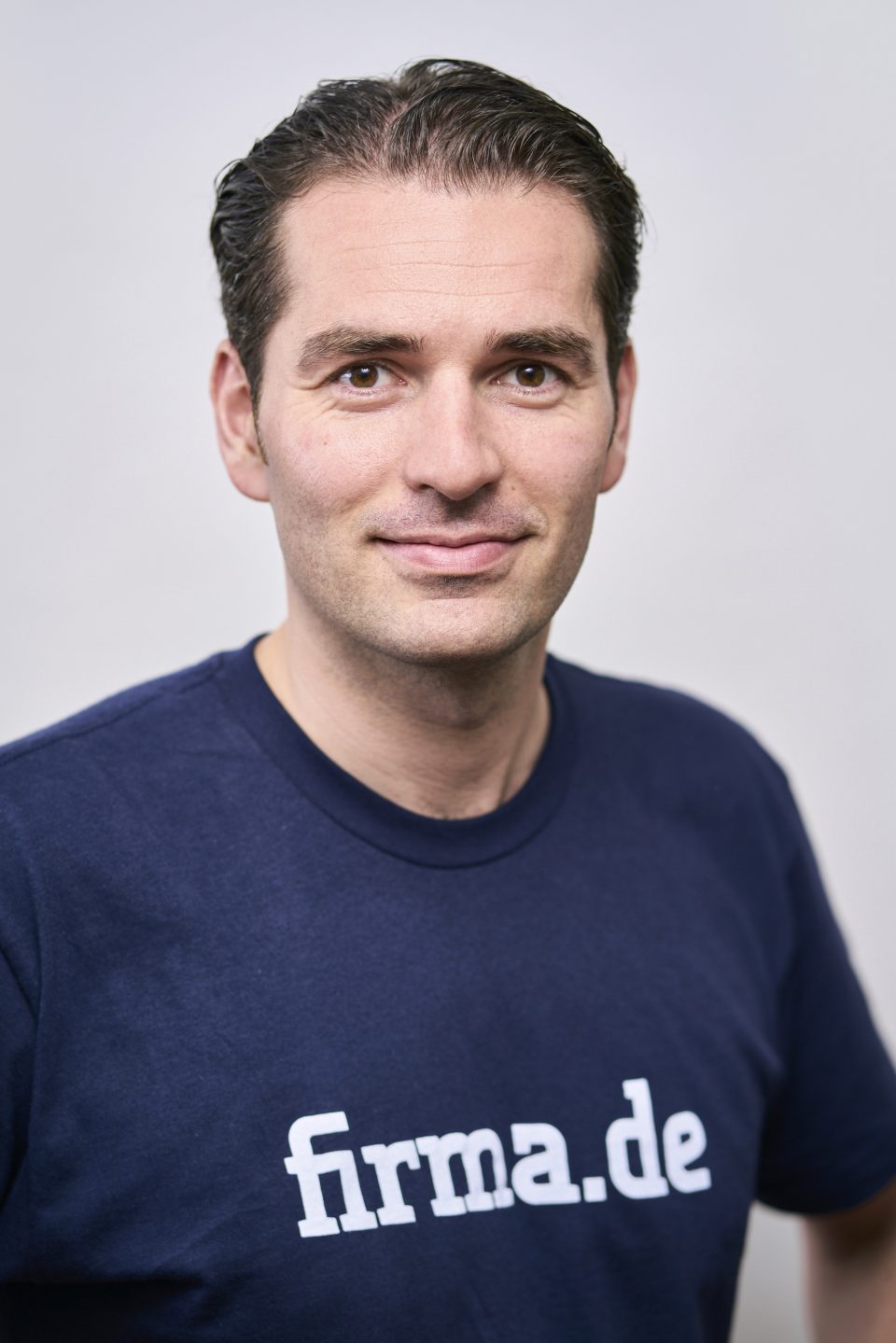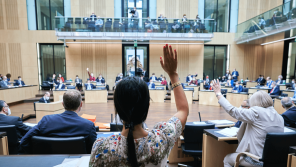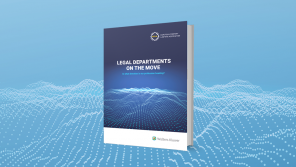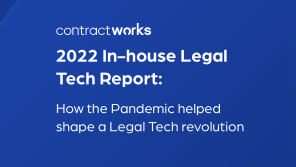(English version below)
Ein Interview mit Christian Manthey – Gründer und CEO von firma.de – über das DiRUG.
In diesem Sommer soll das DiRUG – das Gesetz zur Umsetzung der Digitalisierungsrichtlinie – in Deutschland in Kraft treten. Durch dieses Gesetz sollen etwa die Online-Gründung der GmbH sowie weitere Online-Verfahren für Registeranmeldungen bei Kapitalgesellschaften ermöglicht, neue Regelungen zur Offenlegung von Registerinformationen getroffen und der europäische grenzüberschreitende Informationsaustausch, insbesondere bezüglich Registersachen, verbessert werden. Wir haben mit Christian Manthey, Gründer und CEO von firma.de, über das neue Gesetz, dessen praktische Folgen, das Geschäftsmodell seines Unternehmens sowie die Zukunft eines digitalisierten Gesellschaftsrechts gesprochen. Firma.de ist ein in Deutschland führendes Unternehmen, wenn es um die Unterstützung von Startups in der Gründungsphase und die Entbürokratisierung der Gesellschaftsgründung geht. Dabei hat sich firma.de auf die Fahne geschrieben: Firmengründung muss ohne lästigen Papierkram möglich sein und Spaß machen.
Herr Manthey, welchen Hintergrund hat die Einführung der Möglichkeit der digitalen Gesellschaftsgründung in Deutschland?
C. Manthey: Die EU hatte bereits im Jahr 2019 neue Digitalisierungsstandards für alle EU-Staaten vorgegeben. Das DiRUG wurde entworfen, um diese EU-Richtlinie in deutsches Recht umzusetzen. Ziel der Richtlinie ist es, KMUen durch geringere Kosten sowie weniger Zeit- und Verwaltungsaufwand zu entlasten. Damit wird nun endlich die Grundlage für die längst überfällige Digitalisierung im Beurkundungs- und Registerwesen geschaffen. Das DiRUG macht es bald schon möglich, eine GmbH zu gründen, ohne persönlich beim Notar zu erscheinen.
War der deutsche Gesetzgeber bei der Umsetzung der EU-Richtlinie an strenge Vorgaben gebunden oder konnte viel eigene Gestaltungsfreiheit in das neue Gesetz einfließen? Wie bewerten Sie die Eigeninitiative des deutschen Umsetzungsgesetzgebers?
C. Manthey: Man hätte das Gesetz durchaus auch umfangreicher gestalten können. Aktuell ist der Anwendungsbereich noch relativ begrenzt. Ich nenne hier ein praktisches Beispiel: Nachdem ich eine Gründung abgeschlossen habe, kann ich als Geschäftsführer keine weiteren, sehr üblichen beurkundungspflichtigen Angelegenheiten per Videokonferenz abwickeln – zum Beispiel Änderungen an der Satzung oder Übertragungen von Anteilen – was auch von einigen IHKn kritisiert wurde. Es wird in der Praxis also noch viel Bedarf für den Notartermin vor Ort geben. Doch einiges wurde schon nachgebessert.
Vor kurzem gab es einen Referentenentwurf des Bundesministeriums der Justiz mit sehr guten Änderungsvorschlägen: Registeranmeldungen für alle registerfähigen Rechtsformen sollen online möglich sein; also auch im Partnerschafts-, Genossenschafts- und Vereinsregister. Und eine GmbH-Gründung soll auch mit Sachwerten umsetzbar sein. Ausgenommen ist jedoch weiterhin die Einbringung von Grundstücken oder GmbH-Anteilen.
Alle Ergänzungen in diesem neuen Entwurf begrüße ich sehr und hoffe, dass sie in der finalen Version als Gesetz in Kraft treten werden. Wobei sicherlich mehr möglich wäre, wie man an unserem Nachbarland Österreich sieht, die den Spielraum der Richtlinie noch besser ausnutzen.
Wird der praktische Anwendungsbereich des neuen Online-Verfahrens denn groß sein? Welche Gesellschaftsformen sind umfasst?
C. Manthey: Ab August 2022 wird man direkt online eine UG (haftungsbeschränkt) oder GmbH beim Handelsregister anmelden können, ohne dass die Geschäftsführung im Notariat erscheinen muss. Auch AGen, Genossenschaften und Einzelkaufleute werden sich auf diesem Weg zum Handels- und zum Genossenschaftsregister anmelden können. Nach der Gründung können die genannten Rechtsformen außerdem eine Zweigniederlassung online anmelden.
Alle weiteren Schritte der Unternehmensgründung – wie Kontoeröffnung, Gewerbeanmeldung und steuerliche Erfassung – werden in der Digitalisierung durch das DiRUG bislang nicht berücksichtigt.
Werden alle Notariate das neue online-Verfahren anbieten?
C. Manthey: Meines Wissens können Notarinnen und Notare bis auf Weiteres selbst entscheiden, ob sie das neue online-Verfahren anbieten möchten oder nicht. Unsere Partner-Notare werden die digitale Gründung auf jeden Fall anbieten.

Werde ich mir als Gründer*in aussuchen können, bei welchem Notariat ich das online-Verfahren durchführen möchte?
C. Manthey: Grundsätzlich kann man das selbst entscheiden, allerdings ist man bei Nutzung des Online-Verfahrens an den Amtsbereich gebunden. Das bedeutet, dass sich das Notariat in der Stadt oder Gemeinde befinden muss, in der entweder der Unternehmenssitz oder der Wohnsitz von einem/r der Gesellschafter*innen liegt. Hier hätte ich mir eine etwas weniger strikte Lösung gewünscht, die Gründer*innen mehr Auswahlmöglichkeiten offenlässt.
Wie funktioniert die Identifizierung der Beteiligten vor dem Notar online?
C. Manthey: Die Identifizierung erfolgt für deutsche Staatsangehörige über ein elektronisch übermitteltes Lichtbild und einen Personalausweis mit eID-Funktion. Staatsangehörige anderer EU/EWR-Mitgliedstaaten benötigen eine eID-Karte. Angehörige von Drittstaaten brauchen einen elektronischen Aufenthaltstitel (eAT) mit eID-Funktion. Eine eAT kann von Personen beantragt werden, die eine Aufenthalts- oder Niederlassungserlaubnis (auch Blaue Karte EU, ICT-Karte, Mobile-ICT-Karte) oder die Erlaubnis zum Daueraufenthalt (EU) besitzen. Im Gegensatz zu manchen anderen Ländern hat Deutschland bei der Identifizierung relativ hohe Anforderungen, was ich prinzipiell gut finde. Allerdings schließt es auch einige aus. Gründer*innen aus Drittstaaten ohne Visum für Deutschland/EU können am Online-Verfahren leider nicht teilnehmen, denn sie können keinen eAT beantragen. Wir hoffen sehr, dass die elektronische Identifizierung von Gründern aus Drittstaaten bald etwas einfacher wird und sich internationale elektronische ID-Standards etablieren.
Sehen Sie Vorteile des konventionellen Präsenz-Notartermins gegenüber dem online-Termin?
C. Manthey: Wer einen Online-Notartermin erhält, hat auch keine Nachteile dadurch. Nur bei der Notarwahl gibt es Nachteile, denn man ist regional gebunden. Gerade in kleineren Gemeinden mit nur einem Notarsitz hat das immer Nachteile, denn man kann nicht einfach auf einen Notar in der nächsten Stadt oder im benachbarten Landkreis ausweichen. Wenn der Notar komplett ausgebucht ist, muss man entweder Geduld haben oder auf das digitale Verfahren verzichten. So wird sich an manchen Orten das Angebot verknappen.
Welche Vorteile bietet das neue Verfahren für grenzüberschreitende Gründungen?
C. Manthey: Ich erkenne drei klare Vorteile: Erstens entfällt die Anreise zum Notartermin inklusive Reisekosten – auch für deutsche Bürger*innen im Ausland. Daraus ergibt sich zweitens, dass die Teilnahme aller Gesellschafter und Geschäftsführer kein Kosten- oder Logistikfaktor mehr ist. Drittens können sich Gründerteams den stressigen Weg über Apostillen und Legalisationen für Vertretungsvollmachten sparen. Trotz fehlender einheitlicher internationaler eID-Standards erwarten wir ab August definitiv einen höheren Andrang bei Gründungen aus dem Ausland.
Müssen Gründer*innen trotz der entfallenden Reisekosten bei dem neuen Verfahren mit versteckten Kosten rechnen, die bei der konventionellen Gründung nicht anfallen würden?
C. Manthey: Bei einer Online-Gründung entstehen nur geringe Mehrkosten. 25 Euro pro Beurkundungsverfahren und 8 Euro pro Beglaubigungsverfahren. Alle anderen Kosten bleiben so wie immer, wobei die Reisekosten wegfallen.
Glauben Sie, dass das neue System von Beginn an reibungslos funktionieren wird?
C. Manthey: Sicherlich wird es die ein oder andere Startschwierigkeit geben. Doch die Notariate hatten genug Zeit, um sich professionell auszustatten. Ich bin sehr zuversichtlich, dass alles reibungslos ablaufen wird.
Wer wird von den neuen Regelungen des DiRUG profitieren?
C. Manthey: Vor allem natürlich alle Gründer*innen, die sich damit den Gang zum Notar ersparen werden. Und natürlich diejenigen Notariate, die sich erstens technisch optimal auf die kommenden Regelungen vorbereitet haben, und sich zweitens entsprechend gut positionieren. Den größten Vorteil sehe ich für die Branche und freue mich, dass nun endlich der Startschuss für die Digitalisierung gefallen ist und die Basis gelegt wurde für den “komplett digitalen Notar”, der hoffentlich in einigen Jahren umgesetzt wird.
Was sind Ihrer Meinung nach die Schwachpunkte des DiRUG?
C. Manthey: Wie ich bereits sagte, werden typische Beschlüsse wie Anteilsübertragungen oder Änderungen in der Satzung noch nicht vom Gesetz abgebildet. Ich hoffe, das wird bald nachgeholt. Durch den Online-Notartermin wird das Risiko des Betrugs sicherlich erhöht; hier gibt es von vielen Seiten zurecht Bedenken. Genau deshalb sieht das DiRUG einen hohen technischen Sicherheitsstandard vor: Das Online-Tool der Bundesnotarkammer erfordert wie schon erwähnt die sogenannte eID. Leider stellen aktuell nur 13 der 27 EU-Staaten ihren Bürgern Ausweisdokumente mit dieser Funktion bereit.
Ist die Einführung der online-Gründung Ihrem Geschäftsmodell zuträglich oder verkürzt diese neue Möglichkeit nicht sogar einen Teil des Bedürfnisses nach Ihrem Angebot?
C. Manthey: Nein, überhaupt nicht. Die neue Online-Gründung hat zwar einige kleinere Vorteile, dochinsgesamt wird die Bürokratie für eine Gründung – also z. B. steuerliche Anmeldung, Kontoeröffnung, Gewerbeanmeldung – nicht stark vereinfacht. Alle anderen Schritte bei der Gründung bleiben gleich und viele unserer Kund*innen brauchen eben den Support über den gesamten Prozess hinweg. Ganz im Gegenteil kommt durch das neue Transparenzregister sogar eine neue bürokratische Hürde hinzu. Wir erwarten, dass sich durch diese Neuerung auch ganz neue Fragen und Spezialfälle ergeben werden. Und hier möchten wir auch weiterhin als Bindeglied zwischen Gründer*innen und der Bürokratie einen einfachen und “bürokratielosen” Start ins Unternehmertum ermöglichen.
Wie werden Sie Ihr Angebot an die neue Rechtslage anpassen?
C. Manthey: Wir werden beides anbieten und unseren Gründer*innen die Wahl lassen, ob sie digital oder vor Ort zum Notar möchten. Da wir auch viele ausländische Gründer*innen haben, werden vor allem diese von der neuen Rechtslage profitieren.
Haben Sie bestimmte (Cyber-)Sicherheitsbedenken bei den online-Notarterminen?
C. Manthey: Die technischen Sicherheitsstandards sind hoch, aber natürlich gibt es auch hier gewisse Risiken. Um eine solche Gefahr realistisch einschätzen zu können, sollten Sie jedoch besser einen Spezialisten für Cyberangriffe befragen; da fehlt mir das notwendige Fachwissen.
Glauben Sie, dass das DiRUG die Attraktivität von Deutschland als internationalen Gründungsstandort erhöhen wird?
C. Manthey: Auf jeden Fall. Für viele Gründer*innen bzw. Gesellschafter*innen aus dem Ausland spielt es eine sehr große Rolle, ob sie zur Gründung vor Ort im Notariat sein müssen. Hier wird endlich eine Mauer eingerissen, die bisher viele vom Gründen in Deutschland abgehalten hat. Natürlich ist hier im Einzelfall zu prüfen, ob die Gründer*innen die Anforderungen erfüllen, ob ein eID-Ausweis vorhanden ist etc. Ich bin sehr gespannt, wie gut und reibungslos Online-Gründungen aus dem Ausland ablaufen werden. Der Praxis-Test steht noch aus. Gleichwohl ist es hoffentlich nur der Startschuss. Besonders profitieren könnte Deutschland, wenn auch Kapitalerhöhungen online möglich sind und so ausländische Investoren von überall ohne Vertretung selbst bei dem Beurkundungstermin dabei sein können.
Wird das neue Verfahren dem konventionellen Verfahren den Rang ablaufen?
C. Manthey: Das wäre ein Blick in die Kristallkugel. Ich denke, zunächst muss hier ein Angebot geschaffen werden in Form von verfügbaren Terminen, gutem Support und einwandfreier technischer Umsetzung. Wenn das funktioniert, wird es nicht lange dauern, bis dieses Angebot wahrgenommen und in Anspruch genommen wird.
Viele meiner internationalen Kund*innen sind spätestens seit dem Beginn der Pandemie und den Reiseverboten erstaunt, dass es in Deutschland nicht längst möglich ist, den Notar digital zu besuchen.
Natürlich wird es immer noch Menschen geben, die einen persönlichen Termin bevorzugen. Gerade der Handschlag beim Abschließen eines Geschäfts hat eine lange Tradition! Neben einem Vertragswerk geht es auch um gegenseitiges Vertrauen. Ich denke, viele Deutsche begegnen Neuerungen erst einmal mit einer gewissen Skepsis und sind tendenziell nicht so technikaffin wie andere. Da längst nicht alle Rechtsgeschäfte im online-Verfahren möglich sein werden, wird das physische Notariat mit Vorzimmer auch nicht so bald verschwinden. Es wird vermutliche eine Übergangsphase geben, in der es hybride Angebote gibt – je nach Bedarf und Anliegen. Ein ähnliches Muster sehen wir ja bei den Finanzdienstleistungen: Digitalbanken sind sehr beliebt bei Selbständigen, aber nicht wenige möchten weiterhin den persönlichen Kontakt zum/r Berater*in pflegen und schätzen eine Filiale am Standort.
Aktuell ist das Onlineverfahren wie bereits erwähnt beschränkt auf den Amtsbereich, d.h. den Unternehmens- oder Wohnsitz eines Gesellschafters. Das schmälert den Vorteil in kleinen Städten zumindest bei Einzelgründungen mit einem/r Geschäftsführer*in/Gesellschafter*in natürlich nochmal.
Im aktuellen Koalitionsvertrag steht erneut der flächendeckende sogenannte One-Stop-Shop, der Gründungen innerhalb von 24 Stunden ermöglicht. Wie weit ist Deutschland bei der Umsetzung?
C. Manthey: (lacht) Nach mehreren Koalitionsverträgen, die eine vollständige online-Gründung in Aussicht gestellt haben, bin ich geduldig geworden. Bisher ist der One-Stop-Shop der Bundesregierung nicht mehr als ein kühner Plan, von dem die Realität noch meilenweit entfernt ist.
Ich gebe Ihnen mal ein Beispiel: Ich möchte ein Startup als Kapitalgesellschaft im Großraum Stuttgart gründen. Im besten Fall lasse ich dann als erstes meinen Firmennamen von der IHK prüfen, bevor ich Geld beim Notar lasse. Das dauert mehrere Tage. Als nächstes suche ich einen Notar für die Beurkundung. In der Region kann es sein, dass ich auf einen verfügbaren Termin schon mal drei bis vier Wochen warten muss. Dann muss ich ein Geschäftskonto eröffnen und das Stammkapital einzahlen, das geht meistens schnell. Danach muss ich den Beleg an den Notar weitergeben, damit der die Anmeldung zum Handelsregisterabschließen kann. Dann dauert es einige Tage oder sogar ein paar Wochen bis der Eintrag erfolgt. Erst danach kann ich mein Unternehmen als Gewerbe anmelden. In manchen Gemeinden geht das digital oder ich muss einen Termin beim Gewerbeamt machen. Dann kommt die steuerliche Anmeldung über Elster. Dafür muss ich 622 Eingabefelder verstehen und viele auch ausfüllen. Jetzt muss ich auf meine Steuernummer warten – das kann Wochen dauern. Erst, wenn ich endlich meine Steuernummer erhalte, ist das Startup geschäftsfähig.
Um das nochmal klarzustellen: Das DiRUG wird an dieser langwierigen Prozesskette gar nichts ändern. Der geplante One-Stop-Shop müsste alle diese Stationen digitalisieren und rechts- und datensicher auf einer Plattform vereinen. Die Aufgabe ist also gewaltig und das Ziel sehr ambitioniert. Das Versprechen einer Gründung in 24 Stunden klingt wirklich toll, es ignoriert aber die komplexe Realität, in der jeder beteiligte Akteur sehr unterschiedliche Zuständigkeiten verwaltet.
Gründung ist auch ein dehnbarer Begriff, der bisher nicht im Koalitionsvertrag definiert ist. In manchen Gesprächen kommt es mir so vor, als sei damit nur der Eintrag im Handelsregister gemeint. Für uns ist die Firmengründung abgeschlossen, wenn das Unternehmen operativ tätig werden kann, und das ist die Bereitstellung der Steuernummer durch das Finanzamt.
Welche Unterstützung bietet firma.de Gründer*innen zum jetzigen Zeitpunkt an?
C. Manthey: Wir von firma.de bieten in unserem One-Stop-Shop alles an, was Gründer*innen und Unternehmer*innen vor und nach der Firmengründung brauchen – und das bürokratielos, schnell und individuell. Wir begleiten alle Schritte, koordinieren Termine und bieten digitale Lösungen. Unser Selbstverständnis geht weit über eine Plattform ausschließlich für deutsche Gründerinnen und Gründer hinaus. Wir wollen Deutschland als Wirtschaftsstandort auch für internationale Unternehmer attraktiv machen und das fängt bei einem mehrsprachigen Support an. Deswegen sind alle Angebote und Dienstleistungen von firma.de auf Englisch verfügbar. Nach der Gründung bieten wir smarte Lösungen für den Unternehmeralltag: Digitale Buchhaltung, Digitale Steuerberatung, Digitales Vertragswesen, Markenanmeldung und vieles mehr zum Fixpreis. Gründen und Selbständigkeit sollen Spaß machen. Damit das gelingt, braucht man einen verlässlichen Partner, der außerdem transparente Preise bietet.
Glauben Sie, dass das DiRUG ein erster Schritt in Richtung einer umfassenden digitalen Revolution des Gesellschafts- und Registerrechts ist? Was wünschen Sie sich für die Zukunft?
C. Manthey: Ich bin Unternehmer, kein Jurist. Daher bin ich eher an der Praxis interessiert. Eine Gesetzesänderung kann immer nur das Fundament für reale Veränderung sein. Vor allem, wenn ihre praktische Anwendung freiwillig bleibt. Noch wissen wir zum Beispiel nicht, wie viele Notariate den Online-Prozess tatsächlich anbieten werden und folglich, wie vielen Bürger*innen das neue Verfahren dann tatsächlich in den nächsten Jahren zur Verfügung stehen wird. Meine persönliche Erfahrung zeigt, dass Neuheiten lange brauchen, bis sie in der Breite angenommen werden. Vor fast 15 Jahren wurde die beschleunigte Gründung mit Musterprotokoll eingeführt. Auch das hatte den Geschmack von Aufbruch. Aber selbst heute noch sprechen wir vereinzelt mit Notaren, die diesen Prozess nicht umfassend kennen oder sicher dazu beraten können.
Aus meiner Sicht kommt durch die Umsetzung der EU-Richtlinie endlich etwas ins Rollen, das schon lange von deutschen Politikerinnen und Politikern versprochen wurde – und längst überfällig war. Im Vergleich zu anderen Staaten in Europa hinkt Deutschland trotzdem weit hinterher, was die Digitalisierung von juristischen Dienstleistungen und den Bereich E-Government angeht. Auch das ist kein Insiderwissen. Ich begrüße diesen ersten Schritt, aber Revolution fühlt sich aus meiner Perspektive anders an.
Für die Zukunft wünsche ich mir, dass der gesamte Gründungsprozess vereinfacht wird. Meiner Ansicht nach kann und muss hier noch an vielen Stellschrauben nachgebessert werden. Statt sich mit sechs bis sieben Anlaufstellen rumzuschlagen, sollten Gründer*innen stark entlastet werden. Auch, wenn die einzelnen Abschnitte digitalisiert werden, bleiben diese in der vorhersehbaren Zukunft stark fragmentiert und unübersichtlich. Sobald noch Gewerbeerlaubnisse, Genehmigungen oder Nachweispflichten hinzukommen, sind die Hürden umso höher und die Mühlen der Bürokratie mahlen umso langsamer. Letztendlich bremst die Bürokratie die Motivation von Gründer*innen und auch Unternehmer*innen. Das entmutigt viele bereits, den ersten Schritt der Firmengründung zu gehen. Und das hat ganz reale Konsequenzen für das Unternehmertum in Deutschland.
Wir danken Herrn Manthey für dieses Interview und wünschen ihm und firma.de weiterhin viel Erfolg bei der Unterstützung von Gründer*innen aus der ganzen Welt.
English version:
“Here, a wall is finally being torn down that has kept many from starting a business in Germany”
An interview with Christian Manthey – founder and CEO of firma.de – about the DiRUG.
This summer, DiRUG – the Act Implementing the Digitalization Directive – is scheduled to come into force in Germany. This act is intended to enable, e.g., the online formation of Limited Liability Companies as well as other online procedures for register applications for corporations, new regulations for the disclosure of register information and improve the European cross-border exchange of information, especially with regard to register matters. We spoke with Christian Manthey, founder and CEO of firma.de, about the new law, its practical consequences, his company’s business model, and the future of digitized corporate law. Firma.de is a leading company in Germany when it comes to supporting start-ups in the formation phase and reducing the bureaucracy involved in setting up a company. In doing so, firma.de has taken up the cause: Company formation must be possible without tedious paperwork and must be fun.
Mr. Manthey, what is the background to the introduction of digital company formation in Germany?
C. Manthey: The EU had already specified new digitalization standards for all EU states in 2019. The DiRUG was designed to transpose this EU directive into German law. The aim of the directive is to ease the burden on SMEs by reducing costs and the time and administrative effort involved. This will finally create the basis for the long overdue digitization in the notarization and register system. The DiRUG will soon make it possible to form a GmbH (German LLC) without having to appear in person at a notary’s office.
Was the German legislature bound by strict requirements when implementing the EU Directive, or was it able to incorporate a lot of its own creative freedom into the new law? How do you rate the German transposition legislator’s own initiative?
C. Manthey: It would have been possible to make the act more comprehensive. Currently, the scope of application is still relatively limited. Let me give you a practical example: After I have completed an incorporation, as a managing director I cannot handle any other matters requiring very common notarization by video conference – for example, changes to the articles of incorporation or transfers of shares – which has also been criticized by some Chambers of Industry and Commerce. So, in practice, there will still be a lot of need for the on-site notary appointment. But some things have already been improved.
Recently, there was a draft bill from the Federal Ministry of Justice with very good, proposed changes: Register applications for all legal forms capable of being registered are to be possible online; i.e. also in the partnership, cooperative and association registers. And it should also be possible to set up a limited liability company with non-cash assets. However, the contribution of real estate or GmbH shares is still excluded.
I very much welcome all the additions in this new draft and hope that they will come into force as law in the final version. Much more would certainly be possible, as can be seen in our neighboring country Austria, which makes even better use of the scope of the directive.
Will the practical scope of the new online procedure be large? What types of companies are covered?
C. Manthey: From August 2022, it will be possible to register a UG (German limited liability entrepreneurial company) or GmbH directly online with the commercial register without the management having to appear at the notary’s office. AGs (German stock companies), cooperatives and sole merchants will also be able to register with the commercial and cooperative registers in this way. Once established, these legal forms will also be able to register a branch office online.
All other steps involved in setting up a company – such as opening a bank account, registering it with the trade office, and registering for tax purposes – have not yet been considered in the digitization by the DiRUG.
Will all notary offices offer the new online procedure?
C. Manthey: As far as I know, notaries can decide whether they want to offer the new online procedure or not. Our partner notaries will definitely offer digital incorporation.

As a founder, will I be able to choose which notary’s office I want to use for the online procedure?
C. Manthey: In principle, you can decide for yourself, but when you use the online procedure, you are bound to the office area. This means that the notary’s office must be located in the city or municipality in which either the company’s registered office or the residence of one of the shareholders is located. I would have liked to see a somewhat less strict solution here that leaves more options open to founders.
How will the identification of the parties before the notary work online?
C. Manthey: For German nationals, identification takes place via an electronically transmitted photograph and an ID card with eID function. Nationals of other EU/EEA member states require an eID card. Nationals of third countries need an electronic residence permit (eAT) with eID function. An eAT can be applied for by persons holding a residence or settlement permit (also EU Blue Card, ICT card, Mobile ICT card) or permanent residence permit (EU). Unlike some other countries, Germany has relatively high requirements for identification, which I think is good in principle. However, it is also somewhat exclusive. Founders from third countries without a visa for Germany/EU unfortunately cannot participate in the online procedure, because they are excluded from eAT applications. We very much hope that the electronic identification of founders from third countries will soon become a bit easier and that international electronic ID standards will be established.
Do you see any advantages of the conventional face-to-face notary appointment over the online appointment?
C. Manthey: Those who receive an online notary appointment will not have disadvantages as a result. There are only disadvantages when it comes to choosing a notary, because you are regionally bound. Especially in smaller municipalities with only one notary’s office, this always has disadvantages, because you cannot simply switch to a notary in the next town or in the neighboring county. If the notary is completely booked up, you either have to be patient or do it without the digital process. Thus, in some places, the supply will become scarce.
What are the advantages of the new procedure for cross-border formations?
C. Manthey: I can see three clear advantages: First, there is no longer any need to travel to the notary appointment, including travel expenses – even for German citizens abroad. Secondly, the participation of all shareholders and managing directors is no longer a cost or logistics factor. Thirdly, founding-teams can save themselves the stressful process of apostilles and legalizations for powers of attorney. Despite the lack of uniform international eID standards, we definitely expect a higher number of start-ups from abroad as of August.
Despite the elimination of travel costs, do founders have to expect hidden costs with the new procedure that would not be incurred with conventional founding?
C. Manthey: There are only minor additional costs with online incorporation. €25 per notarization procedure and €8 per official certification procedure. All other costs remain as they always have, with travel expenses being eliminated.
Do you think the new system will work smoothly right from the start?
C. Manthey: There will certainly be some teething problems. But the notary’s offices have had enough time to equip themselves professionally. I am very confident that everything will run smoothly.
Who will benefit from the new DiRUG regulations?
C. Manthey: First and foremost, of course, all founders who will save themselves the trouble of going to a notary. And, of course, those notary’s offices that, firstly, have optimally prepared themselves technically for the coming regulations and, secondly, have positioned themselves accordingly. I see the greatest advantage for the industry and am pleased that the starting signal for digitization has finally been given and the basis has been laid for the “completely digital notary”, which will hopefully be implemented in a few years.
In your opinion, what are the weak points of the DiRUG?
C. Manthey: As I said before, typical resolutions such as share transfers or changes in the articles of association are not yet reflected by the act. I hope that this will be remedied soon. The risk of fraud is certainly increased by the online notarization appointment; there are concerns about this from many sides, and rightly so. This is precisely why DiRUG provides for a high technical security standard: As already mentioned, the online tool of the Federal Chamber of Notaries requires the so-called eID. Unfortunately, only 13 of the 27 EU states currently provide their citizens with ID documents that include this function.
Is the introduction of online incorporation beneficial to your business model or does this new possibility even shorten part of the need for your company’s services?
C. Manthey: No, not at all. The new online incorporation does have some minor advantages, but overall, the bureaucracy for incorporation – e.g., tax registration, account opening, trade registration – is not greatly simplified. All other steps in the formation process remain the same, and many of our customers need support throughout the entire process. On top of that the new transparency register even adds a new bureaucratic layer. We expect that this innovation will also give rise to completely new questions and special cases. And here we would like to continue to act as a link between founders and the bureaucracy to enable a simple and “bureaucracy-free” start into entrepreneurship.
How will you adapt your services to the new legal situation?
C. Manthey: We will offer both and let our founders choose whether they want to go to the notary digitally or on site. Since we also have many foreign founders, they in particular will benefit from the new legal situation.
Do you have any specific (cyber-)security concerns about online notary appointments?
C. Manthey: The technical security standards are high, but of course there are certain risks here as well. However, to realistically assess such a risk, you’d better consult a cyberattack specialist; I lack the necessary expertise there.
Do you think DiRUG will make Germany more attractive as an international startup location?
C. Manthey: Absolutely. Whether the physical attendance at the notary’s office is required is a key criterion for many international founders. Here, a wall is finally being torn down that has prevented many from founding a company in Germany. The requirements need to be checked in each individual case, i.e., eID etc. I am very curious to see how online international formations will go. The practical test is still to come. Nevertheless, this is hopefully only the starting point. Germany could benefit particularly if capital increases are also possible online, so that foreign investors can attend the notarization meeting themselves from anywhere without having to be represented.
Will the new procedure outstrip the conventional procedure?
C. Manthey: That would be looking into the crystal ball. I think the first thing to do is to create a service here in the form of available appointments, good support and flawless technical implementation. If that works, it won’t be long before this offer is taken up and used.
Since the start of the pandemic and the travel bans, at the latest, many of my international customers have been surprised that it has not long been possible to visit the notary digitally in Germany.
Of course, there will still be people who prefer a personal appointment. Especially the handshake when closing a deal has a long tradition! In addition to a set of contracts, it’s also about mutual trust. I think many Germans initially approach innovations with a certain amount of skepticism and tend not to be as tech-savvy as others. Since not all legal transactions will be possible online by any means, the physical notary’s office with an anteroom will not disappear any time soon. There will probably be a transitional phase in which there will be hybrid offers – depending on needs and concerns. We see a similar pattern in financial services: Digital banks are very popular with the self-employed; but quite a few still want to maintain personal contact with the advisor and value a branch office at their location.
Currently, as already mentioned, the online procedure is limited to the official area, i.e., the company or residence of a shareholder. This naturally reduces the advantage in small towns, at least for individual start-ups with one managing director/shareholder.
The current agreement of the German federal governmental coalition once again includes the nationwide so-called One-Stop-Shop, which enables formations within 24 hours. How far along is Germany in implementing this?
C. Manthey: (laughs) After several coalition agreements that promised full online formations, I have become patient. So far, the federal government’s One-Stop-Shop is nothing more than a bold plan from which reality is still miles away.
Let me give you an example: I want to establish a start-up as a corporation in the greater Stuttgart area. In the best-case scenario, the first thing I’d do is have my company name checked by the Chamber of Industry and Commerce. This takes several days. Next, I’d look for a notary for the notarization. In that region, I may have to wait three to four weeks for an available appointment. Then I’d open a bank account and deposit the share capital, which usually goes quickly. After that, I’d forward the receipt to the notary so that they can complete the application to the commercial register. Then it takes a few days or even a few weeks until the entry is published. That would be my cue to register my company with the trade office. In some municipalities, this can be done digitally. If not I’d have to make an appointment. In the meantime I’d finalize the tax registration via ELSTER by making sense of 622 input fields. Then I’d have to wait for my tax number – that could take weeks. When I have finally received my tax number the start-up will be ready for business.
Let’s get this straight: DiRUG won’t change this lengthy process at all. The planned One-Stop-Shop would have to digitize all of these stations and unite them on one platform in a legally and data secure manner. So, the task is enormous and the goal very ambitious. The promise of a formation in 24 hours sounds really great, but it ignores the complex reality in which each actor involved manages very different responsibilities.
Company formation is also an elastic term that has not yet been defined in the Government’s coalition agreement. In some conversations, it seems to me that it only means the entry in the commercial register. For us, company formation is complete when the company can start operating, and that happens with the provision of the tax number by the tax office.
What support does firma.de offer to founders at the present time?
C. Manthey: In our One-Stop-Shop, we at firma.de offer everything that founders and entrepreneurs need before and after founding a company – without bureaucracy, but quickly and individually. We accompany all steps, coordinate appointments, and offer digital solutions. Our self-image goes far beyond a platform exclusively for German founders. We want to make Germany attractive as a business location for international entrepreneurs as well, and that starts with multilingual support. That’s why all of firma.de’s services are available in English. After the formation, we offer smart solutions for everyday entrepreneurship: Digital accounting, digital tax consulting, digital contracting, trademark registration and much more at a fixed price. Starting up and being self-employed should be fun. For this to succeed, you need a reliable partner who also offers transparent prices.
Do you believe that DiRUG is the first step toward a comprehensive digital revolution in company and registry law? What do you wish for the future?
C. Manthey: I am an entrepreneur, not a lawyer. That’s why I’m more interested in practice. A change in the law can only ever be the foundation for real change. Especially if its practical application remains voluntary. For example, we still don’t know how many notary’s offices will actually offer the online process and, consequently, how many people will actually have access to the new procedure in the next few years. My personal experience shows that innovations take a long time to be widely adopted. Almost 15 years ago, accelerated incorporation with standardized incorporation protocols was introduced. That, too, had the flavor of a new beginning. But even today, we occasionally talk to notaries who do not know about this process comprehensively or can safely advise on it.
From my point of view, the implementation of the EU Directive finally sets something in motion that has long been promised by German politicians – and was long overdue. Compared to other countries in Europe, Germany nevertheless lags far behind when it comes to the digitization of legal services and the area of e-government. That’s not insider knowledge either. I welcome this first step, but revolution feels different from my perspective.
For the future, I would like to see the entire incorporation process simplified. In my opinion, there are still many things that can and must be improved here. Instead of having to deal with six or seven contact points, founders should be relieved of a lot of work. Even if a few parts are digitized, the whole process will remain highly fragmented and confusing in the foreseeable future. As soon as business licenses, permits or verification requirements are added, the hurdles are all the higher and the mills of bureaucracy grind all the slower. Ultimately, bureaucracy slows down the motivation of founders and entrepreneurs. This already discourages many to take the first step of founding a company. And that has very real consequences for entrepreneurship in Germany.
We thank Mr. Manthey for this interview and wish him and firma.de continued success in supporting founders from all over the world.
This interview was conducted in German language.




